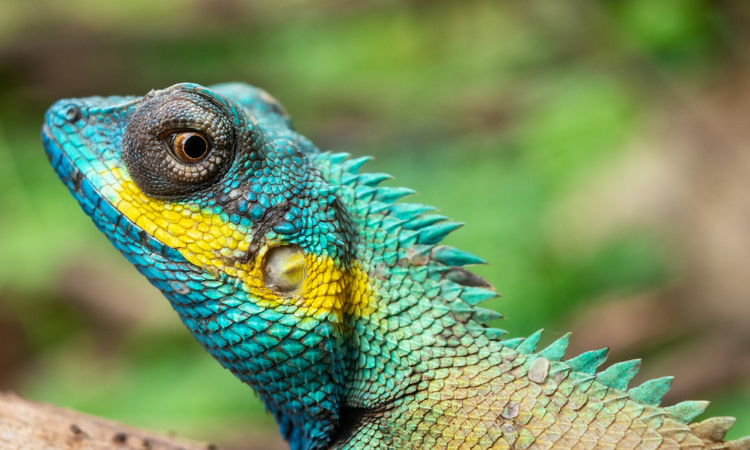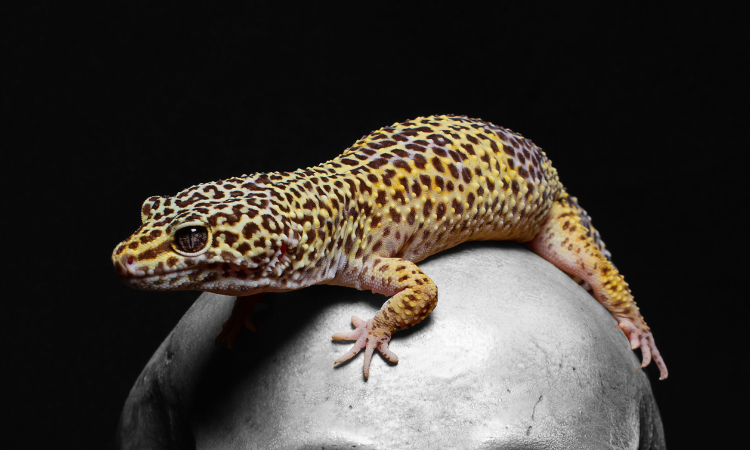If you’ve recently added a gecko to your family, then you may have noticed their unique behavior and habits – some of which can seem intimidating if you’re not familiar with it. One common question that many new gecko owners have is whether or not the cute little pet can bite them. It’s completely understandable to be concerned about this because the sharp teeth of a gecko can look quite formidable!
Fortunately, most geckos aren’t aggressive and there are ways that you can reduce any fear of being bitten by your new pet. Today we’re going to address all these questions associated with owning a reptilian companion so that all worry – both yours and theirs – is gone. Keep reading to get the inside scoop on how to handle potential bites from your excitable friend safely and responsibly!

Introducing the Gecko – Types and Characteristics
Geckos are small and colorful lizards found all over the world. They come in many different shapes, sizes, and colors, with some gecko species equipped with specialized toe pads for climbing and clinging onto walls and ceilings, making them one of the most adept climbers in the world.
Their wide variety of distinctive markings are what give geckos their unique charm, helping them to stand out from other reptilian creatures. They are typically carnivorous but can be omnivorous depending on species; common gecko food sources include various types of insects and worms.
Geckos have a special vocalization with which they communicate with each other; this includes chirps, clicks, beeps, and croaks that have a unique “gecko sound”. Overall geckos make fascinating pets due to their bright personalities despite their small size!
Understanding the Gecko’s Bite – Are They Dangerous or Harmful to Humans
The gecko is known for its ability to scale any surface with its remarkable adhesive toe pad abilities, but some geckos also have quite a bite! Geckos are naturally curious and unafraid of humans, which sometimes leads to geckos exploring the softer parts of our bodies.
Despite their delicate size, geckos possess powerful jaws and razor-sharp teeth – perfect for breaking into juicy insect meals. Though geckos are generally harmless and not aggressive towards humans, occasionally they will bite if provoked or startled.
Fortunately gecko saliva contains antiseptic qualities that neutralize the sting of the bite; however it is still advisable to always use caution when handling a gecko.

What to Do if You’re Bitten by a Gecko
If you ever find yourself in the unfortunate position of being bitten by a gecko, don’t panic – geckos are mostly harmless and they are not venomous. Immediately wash the area with soap and warm water to reduce any risk of infection.
Make sure to keep the wound clean and covered if possible; gecko bites can develop into serious wounds if left untreated. Call your doctor if you experience redness or swelling near the site of the bite or if you develop any other worrying symptoms such as nausea, fatigue or fever.
Don’t forget: geckos may be small but their bites still require appropriate attention.
Is It Possible to Have an Allergic Reaction From a Gecko Bite
It is possible to have an allergic reaction from gecko bites, although it is not a common occurrence. Geckos are normally harmless, nonvenomous lizards whose only defence mechanism is to bite if provoked or scared.
Symptoms of allergy typically include redness, swelling, and itching at the site of the bite. Anyone who experiences any signs of gecko-related allergies should contact their doctor for advice on what treatments may be needed and which antivenom might be necessary if applicable.
Taking simple steps such as cleaning the area of the bite routinely with soap and water may also help relieve discomfort so that no further medical intervention is required.
Prevention Tips To Avoid Getting Bitten By a Gecko
Geckos, while small, can still cause quite a bite. In order to prevent gecko bites from occurring, there are a few simple tips that should be kept in mind. Number one is to never try and handle wild geckos, as even the most docile gecko can become agitated or scared when not given its space.
Another method of gecko bite prevention is to keep the gecko habitat clean and free of surprises. Lastly, if possible inspect any areas with geckos before entering in order to make sure that none are in harm’s way. By following these simple yet effective tips, gecko bites can easily be prevented.

Common Myths About Geckos and Their Bites
Geckos are one of the most unique and fascinating creatures on Earth. They come in different shapes, sizes, and colors, and can be found in warm climates around the world. Unfortunately, geckos have been given a bad reputation due to several common myths that have grown up around them over time.
Many people believe that geckos can give you painful or venomous bites when they feel threatened; however, geckos cannot cause you any pain since they don’t have venom-producing glands. Another myth is that geckos get bigger as they age; however geckos are actually static in size throughout their lifespan.
Additionally, geckos do not make noise! Despite common belief geckos do not chirp or bark like other lizards so you won’t hear them scurrying about at night.
It is important to understand the truth about gecko behavior instead of believing these myths so as not to undermine their noble contributions to our planet’s delicate ecosystem.
In summary, geckos are interesting and fascinating creatures that can sometimes cause unexpected harm or fear. Although their bite is strong and can pierce our skin, it isn’t generally harmful and the risk of serious infection or allergic reaction is minimal.
To avoid being bitten in the first place, make sure you wear appropriate clothing when handling them or playing near them in the wild. Finally, be aware of some of the myths about gecko bites – these have been shown to be largely false.
All in all, understanding more about gecko’s bite should empower us to take appropriate precautions when dealing with them!
Related posts:

Hi – I’m Erika, the lead gecko enthusiast here at Geckopedia! I write articles about pet geckos, including what to feed your leopard gecko and how to help your pet gecko live a long, happy life! I graduated with advanced degrees from UC-Berkeley, the University of Southern California (USC) and Indiana University-Bloomington, where I studied Biology and Animal Science. I use my experience to help others learn about gecko care, and I am an advocate for all topics gecko related!
